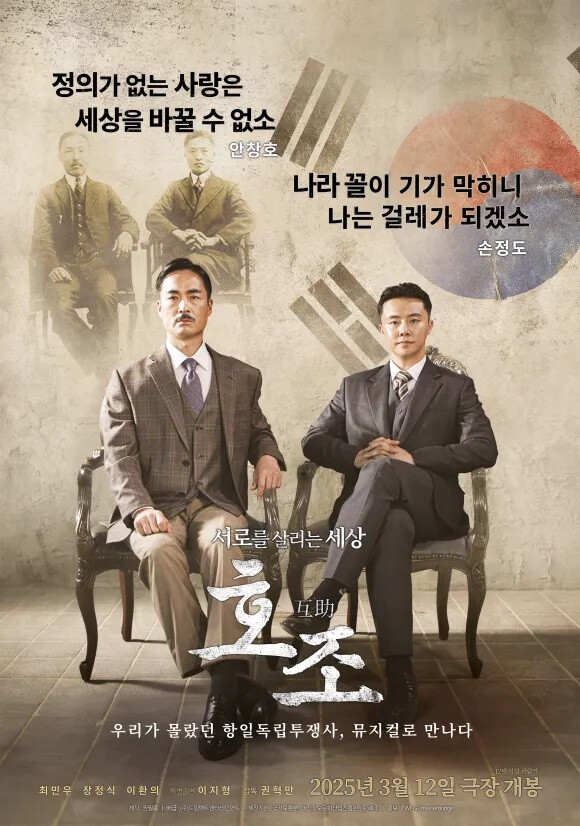
Seoul, Korea – Ahead of the 80th anniversary of Korea's liberation, the musical film Hojo (互助) is once again drawing attention. This epic film depicts the lives of independence activists Dosan Ahn Chang-ho and Reverend Son Jung-do, powerfully portraying their Christian devotion and the spirit of the independence movement through intense drama, captivating music, and dance, leaving a deep impression on the audience.
The film's title, ‘Hojo,’ meaning ‘to live by helping each other,’ originates from the Hojo Ideal Village in Jilin Province, where independence activists dreamed of a community capable of self-reliance and solidarity beyond mere liberation. This evokes the spirit of today's Habitat for Humanity movement. Hojo is not just a historical drama. The dedication and patriotism of the two leaders, filled with faith and hope, resonate deeply with us today, posing the question, ‘What is the Republic of Korea?’
Sworn Brothers United by Justice and Love
The film begins in the summer of 1907, at the site of the Namdaemun Battle triggered by the forced dissolution of the Korean army by Japan. The story unfolds with the fateful meeting of Ahn Chang-ho, who organized the secret society Shinminhoe and the national movement group Heungsadan, and Reverend Son Jung-do. Ahn Chang-ho's belief that "love without justice cannot change the world" and Son Jung-do's determination, "The state of the nation is appalling, so I will become a rag," represent the fervent patriotism of the two figures.
The two men dedicate their bodies and minds to save the Joseon Dynasty, which is in a precarious situation. In 1912, following the assassination plot against Katsura in Harbin, Son Jung-do is arrested and brutally tortured, while Ahn Chang-ho embarks on a path of exile. In 1919, in the Shanghai Provisional Government, Ahn Chang-ho serves as the Minister of Home Affairs, and Son Jung-do as the Chairman of the Provisional National Assembly, where they establish the nation's name as ‘Republic of Korea.’ ‘Republic of Korea’ signifies a democratic government rather than an empire, and the subsequent resolution to join the League of Nations became the cornerstone for the participation of UN forces during the Korean War.
However, due to the division within the Provisional Government, Son Jung-do leaves for Jilin and establishes a Korean community village in 1927. He sells all his remaining property in Joseon and donates it to build the ideal village. The film revisits their dream with the moving song, "From Baekdu to Halla, from Tamna to Balhae."
Son Jung-do and Ahn Chang-ho, and Admiral Son Won-il
Reverend Son Jung-do was a mentor to Yu Gwan-sun and a close friend of Kim Hyong-jik, Kim Il-sung's father, with Kim Il-sung himself recalling him as a "lifesaver" and a "conscientious patriot." Ahn Chang-ho was a figure respected by Syngman Rhee and dedicated himself to fostering the capabilities of the Korean people based on Christian faith and liberal democracy.
Admiral Son Won-il, Son Jung-do's eldest son, also makes a brief appearance in the film. An independence activist, the first Chief of Naval Operations, and the 5th Minister of National Defense, he is known as the ‘father of the South Korean Navy’ for successfully leading the Incheon Landing Operation and is considered a symbol of the South Korean Navy alongside Yi Sun-sin and Jang Bogo.
Director Kwon Hyuk-man's Wish
Hojo is the work of Director Kwon Hyuk-man, who received the ‘Filmmaker of the Year’ award at the Seoul International Agape Film Festival with unwavering determination. He expressed regret over the lack of promotion due to the film's low budget, stating, "Only 8,000 people have seen it, but I hope that as we approach the 80th anniversary of liberation, this film will serve as an opportunity to reflect on its meaning not just as a story of the past, but as something relevant today." He also added, "I wanted to share a life of practicing faith and justice."
Fervent Enthusiasm and Message
The special screening event held at the Gangnam City Theater was met with fervent enthusiasm, with numerous organizations such as the National Council for Reconciliation and Cooperation, Heungsadan, and the Association of Patriots and Veterans participating. In an era of conflict and division, Hojo conveys a triumphant hymn: "May light overcome darkness, love overcome hatred, and hope overcome despair."
The film carries a message for young people to learn "the courage and hope of dreaming of an ideal village in someone else's land despite having no country." Praying that the Republic of Korea, once in crisis, will be reborn as a prosperous nation under God's grace, it is hoped that this film will reach a wider audience.
[Copyright (c) Global Economic Times. All Rights Reserved.]



























